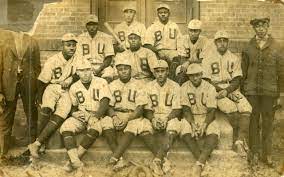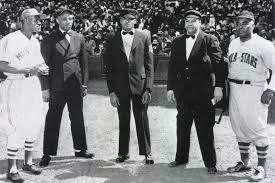




Every baseball fan knows about the Negro Leagues, that parallel baseball universe that competed and thrived in the decades before “baseball apartheid” ended and America’s Pastime brought Jackie Robinson, Larry Doby and others into the Major Leagues.
Ken Burns had a hand in popularizing the Negro Leagues and placing them within the context of the segregated game in his PBS series “Baseball.” He turned Kansas City Monarchs veteran Buck O’Neil into a star, and O’Neil revived the memories of Satchel Paige, Josh Gibson, Cool Papa Bell and others.
O’Neil is “back” in the new Sam Pollard documentary backed by Roots star, “Tonight Show Band” leader and film producer Questlove. “The League” is an entertaining survey of Negro Leagues history with special attention paid to their place within the African American life of their day.
O’Neil, like Henry Aaron, Maya Angelou, Bob Feller and many others who appear in “The League,” has passed away. But the decades of interviews they and many others left behind flesh out a film that features historians, sportswriters, scholars and museum curators who tell this story through the colorful characters who put on a show, and those ran the show behind the scenes.
It is the poet, actress and memoirist Angelou who gives the film its title, noting that after the “official” birth of the Negro Leagues in 1920, anybody in any Black community in America knew what you were talking about “when you said ‘The League.'”
The great teams of that era, roughly 1920 to 1951, were The Philadelphia Crawfords and the Homestead Grays, the Newark Eagles and those Monarchs of Kansas City.
Entirely too many teams were called “Giants” — Chicago American Giants, Washington Elite Giants, Nashville Standard Giants, Cuban X-Giants, Miami Giants, Brooklyn Royal Giants and Bacharach Giants and so on. And that’s one way, along with ever shifting lineups, allignments and the like, that the film struggles a bit with literal Negro Leagues history.
But even Major League Baseball has had problems wrestling with that tiger, trying to decide who was “major” and who was more of a minor league or barnstorming operation and when this or that team or league became “official.”
Pollard, who produced episodes of the PBS Civil Rights doc series “Eyes on the Prize” and directed “MLK/FBI,” gives us a history of segregated baseball, which began that day in 1887 when legendary baseball pioneer Cap Anson refused to let his team take the field against a Major League team fielding a Black player, and didn’t end until Jackie Robinson took the field for the Brooklyn Dodgers in April of 1947.
Forgotten figures like player, manager, owner and league founder Andrew “Rube” Foster, “one of the greatest baseball minds” ever, are given their due. Foster helped make the Negro Leagues a faster, “more aggressive” and more theatrical version of a game that turned slow and stodgy as soon as Babe Ruth started hitting home runs in the “live ball” era.
Foster picked the motto of the “separate” Negro National League, which came to life just after the “red summer” of race riots that followed World War I. He borrowed a phrase from Frederick Douglass to describe what Black players and Black businesspeople starting teams would be facing.
“We are the Ship, All Else the Sea”
The film punches holes in the hallowed myth of Branch Rickey, the Dodgers GM who took that bold step of integrating the majors. Rickey set a precedent that Major League teams didn’t need to compensate Negro Leagues teams for players they signed to contracts.
Negro Leagues teams were owned by African Americans, and Rickey found ways to delegitimize them.
In introducing Newark Eagles co-owner Effa Manley, via oral history interviews, we learn how the Negro Leagues pushed for integration of the game for years, but had every reason to expect to be paid for players they developed and introduced to white baseball and whom they had under contract. The regal Manley didn’t care for Rickey. She much preferred colorful Cleveland franchise owner Bill Veeck, who called her to tell her he wanted her player Larry Doby to be the first Black American League player, and paid her for his rights.
It wasn’t a market value price, we’re told. But it was the principle and the cash that mattered.
Where “The League” sparkles is in its retrieving interviews with the great pitcher Paige, Monte Irvin and other Negro Leagues stars who lived long enough for the country to start interviewing Black baseball players about those years.
Also invaluable is the memory of Negro Leagues umpire Bob Motley, who recalled everything from idolizing the players and angling for a shot at umpiring to the nature of the bus rides between towns and the segregated hotel and restaurant situation for anybody traveling while Black back then, even star ball players.
They lived on “peanut butter and bread,” Negro Leagues player turned baseball home run king Henry Aaron remembered.
Pollard’s expert witnesses note the role “The League” played in the African American business community as the largest Black-owned enterprise of its day. Early on, “context” tends to overwhelm everything else, as we grapple with The Great Migration and the role the World Wars played in mobilizing African American leaders and followers to demand equal rights.
But at every turn, the context comes back to the game, which players could play in the Caribbean Winter Leagues each off season, where “color” didn’t matter and they were reminded of what America might someday embrace.
Books and a visit to the Negro League Baseball Museum are still the best place top get a chapter-and-verse history of African American baseball, pre-Cap Anson and on through to Jackie Robinson. But “The League” does much of what you’d want a documentary on the subject to do — highlight colorful figures, let them speak, where possible, and park it all within the context of an America that drifted from “Plessy v. Ferguson” to “Brown vs Board of Education,” with baseball leading the way into segregation, but also leading (along with activists and World War II) the way out.
Rating: PG
Cast: Monte Irvin, Junius “Red” Gaten, Maya Angelou, Henry Aaron, Amiri Baraka, Buck O’Neil. Bob Motley, Satchel Paige, Bob Feller, Gerald Early, Effa Manley and Bob Kendrick.
Credits: Directed by Sam Pollard. A Magnolia (July 14) release.
Running time: 1:44

